- Home
- Brian Lumley
In the Moons of Borea Page 5
In the Moons of Borea Read online
Page 5
Slowly, eerily, her long red hair floated up over her head, drifting lazily, weightlessly above her. Her face became suffused with a carmine tinge that brightened steadily as it burned out from beneath closed lids. The bones of her skull began to show through her flesh like an X-ray picture, and twin carmine stars blazed where her great eyes had been. Now she herself drifted up from the rocky floor, long legged, straight-backed, regal as a materpiece of some fantastic macabre sculptor, her hair and head ablaze with an inner light.
A moment later, coming suddenly upon her from the corridor at her rear, an Eskimo watchkeeper from the roof of the plateau stopped dead in his tracks at the fearful sight of his sovereign in the act of commanding the winds. Seeing that Armandra was already aware of all that transpired, without daring to disturb her in any way, he bowed himself out backward and hurried back the way he had come.
His skin crawled with the sensation of unseen energies, powers of air and space that concentrated now about Armandra, held as yet in check by her, ready to leap in obedience of her slightest command .. .
`Henri, we're in big trouble,' Silberhutte shouted up to the man who flew above him. De Marigny barely heard the other's words before they were snatched away by squalling winds which seemed to howl now from every corner of the sky. He held the cloak on course as steadily as he could and glanced down to see the Texan twisting this way and that where he hung suspended, scanning the sky and shaking his whipping hair out of his eyes.
`Is it Ithaqua?' de Marigny shouted back.
`Yes, and any time now. Look at the sky — there, to the east!'
De Marigny looked as bidden and saw a fantastic, freakish thing. The sky itself seemed acrawl with sentient, deliberate motion.
The clouds, white and grey and a mixture of both — heavy nimbostratus and wispy cumulus alike, from all strata of Borea's atmosphere — were being drawn, sucked toward some central point. It seemed to de Marigny that he gazed upon a huge whirlpool in the sky, a cauldron of boiling clouds. More strongly yet the winds howled and rushed, threatening now to drag the cloak and its passengers, too, toward that portentous and awe-inspiring aerial phenomenon.
In a matter of seconds the sky became still darker and angry, until it was as if a deep and dreadful twilight had fallen over Borea. Now the clouds jostled and careened above, blue-black and laced with brightly flickering traceries of electrical fire; while eastward, at the centre of the tumult, there seemed to be a great, continuous explosion taking place in the upper atmosphere. The clouds boiled down and outward from that point, like an inverted ocean hurled back by the emergence of a volcano of the upper air, except that where the cone should be, only an area of clear sky now showed.
The clear patch rapidly enlarged as, suddenly, the clouds took flight. They raced away from that spot, writhing and roaring their terror with thunder voices across Borea's tortured heavens, hastening one another with lashes of lightning. And finally de, Marigny and his passenger saw why the clouds fled in such chaotic panic .. .
For now he came, striding down from vaults of space as a giant descends an invisible stairway, falling out of the sky on great webbed feet, glaring down on the white waste through huge carmine stars that burned as the fires of hell themselves in his darkly demonic head.
Ithaqua the Wind-Walker was back on Borea!
6 Traitor Winds
`Henri, can you get us out of here?' Silberhutte's shout fought the shrieking wind, reaching up to the man who piloted the cloak.
`I can get closer to the ground,' de Marigny yelled back. `Try to stay close to whatever cover there is. But there's no way we can make more headway. Perhaps he won't see us.'
`Not much hope of that. He doesn't miss a thing. But look over there — the snow-ship. That'll be Kota'na and the rest of my men.' The Warlord paused to let the shrieking of the wind die down a little, then continued: 'That ought to give Ithaqua a tiny problem: which target to pick off first!' Unwittingly he had echoed Armandra's own thoughts.
Now the Old One's temple stood to the rear, and as the cloak dropped toward the white waste, so snow and ice crystals came up in stinging flumes to greet it. The temperature had dropped alarmingly, and de Marigny was sure that he must already be suffering from exposure. He could barely feel his fingers where they worked at the control studs, and his beard, hair, and eyebrows were rimed with frost.
With only three or four miles to go now to the plateau, still that looming refuge of rock seemed a thousand light-years away. De Marigny's exhaustion was reaching a critical stage, and he could barely keep his eyes open in the blast of ice crystals that rushed and eddied over the surface of the white waste. Occasionally, through breaks in the flurries, he would catch a glimpse of a great wedge-shaped ship that sailed on three massive skis across the icy surface half a mile to his left, but it was becoming too much of an effort to do anything other than control the cloak as it was rocked and buffeted by gust after gust of frigid air, snow, and diamond-hard particles of ice.
Then Ithaqua's shadow fell over them as they flew, and looking up, de Marigny was spurred to greater effort as he stared into the gigantic face of that living doom called the Wind-Walker. What did the old Eskimo legends of Earth say? That to gaze into Ithaqua's eyes was to be damned forever? Well then, de Marigny knew he was damned, and moreover that the threatened doom would not be too long in coming.
Hideously anthropomorphic, the Old One stood in a sky from which all clouds were totally fled now. He stood there, impossibly still, on a half-mile-high pedestal of thin air, peering down through eyes which had narrowed to the merest carmine slits.
`My God,' de Marigny thought to himself. 'He's seen us!
But no, three-quarters obscured by snow flurries as they flew low over the surface, the Wind-Walker had not seen them . . . yet. But he had seen the snow-ship and knew it to be of the plateau. The flaring, bottomless pits which were his eyes opened up wide, and his monstrous black blot of a head rocked back in an attitude of crazed laughter. His whole body shook with silent, lunatic glee.— but in the next moment he was still and cold once more.
Slowly the vastly bloated figure reached a taloned hand into the sky where clouds were already forming, materializing even as he moved. His hand reached into the new formed cloud bank, withdrew holding a huge ball of ice! Lower the Wind-Walker stepped, down an invisible staircase of frozen air, and his eyes glared more hellishly yet as his arm went back, almost leisurely, in preparation for a throw.
'Get us up, Henri,' Silberhutte yelled. `Up, man, where he can see us!'
But de Marigny had already anticipated the other's scheme, had indeed undertaken a rapid ascent on his own initiative; and up above the flurries rode the cloak, up into the view of Ithaqua where he stood poised in midair, a gigantic statue of black ice imbued with monstrous life. And the ploy — however dangerous, however reckless — worked, at least for the time being.
With the plateau no more than a mile distant, making what speed they could against the rushing wind and howling snow devils, the snow-ship and cloak with its two passengers battled their way across the white waste beneath the gaze of the Wind-Walker. And the carmine orbs of his eyes went from ship to cloak as he paused in alien approximation of consternation.
Lower still he stepped, glowing eyes huge and flecked now with sparks of gold, down toward the plain beneath. The snow-ship he finally dismissed with one last searching glance; the cloak — ah! — that was where his real interest was centered.
Ithaqua could hardly credit his good fortune. Unless he was mistaken, the flying device that fled across the snow beneath his burning gaze bore two of his worst enemies, enemies of all the Great Old Ones. Men of Earth, one brought here in great error by himself and the other now that was most interesting. Could it be that yet a third male human being — the most hated of all human beings — could it be that he, too, was on Borea? For how else could this earthbound worm beneath, the pilot of the flying cloak, have reached Borea other than in the time-clock of Titus Crow, nemesis of
the CCD?
Well then, if Titus Crow were close at hand, there was danger — even for Ithaqua of the Snows, great danger — in the shape of the weapon that Kthanid the Elder God had built into the time-clock, whose ray was as a rapier against the flesh of the CCD. Even now Crow might be rushing to the rescue of the two who rode the cloak. Ithaqua's eyes became carmine slits once more as he thought of Crow. His hand closed into a giant's fist, crushing the ice ball he carried into blue shards that flew in all directions like an aerial bomb burst.
Then his hand opened and reached down; taloned doom that closed on the fleeting pair as an eagle falls to its prey. Utterly impotent to avoid its approach, Silberhutte and de Marigny watched the descent of that vast demon claw, that hand open and reaching to snatch them out of the icy air, to crush them into raw red pulp. And knowing that this must be the end, still the Texan thought to open his mind and send one last blast of telepathic hate in Ithaqua's direction:
`Do your worst, Hell-Thing — for it's what I would do to you given half a chance!'
A great black shadow blotted out the sky as lthaqua's hand came down upon them, fingers closing. Then —
From nowhere, at the last moment, a whirling snow devil enveloped the cloak, thrust it furiously toward the plateau's now looming rock face. The Wind-Walker's hand closed on thin air, and astounded and enraged, he hurled his arms wide to the skies and screamed silent threats at his minion elementals one of which, obviously in error, had whisked his enemies from his grasp. Again he reached for the pair, more in anger than eagerness this time, but once more they were rushed from his frustrated, bloating fingers by — by traitor winds!
The first time might have been a mistake, however stupid a mistake, but not the second. Not twice. Not after his warning. No, this was outside interference. This was . . . Armandra!
Armandra, the Woman of the Winds, Ithaqua's wayward daughter who would not accompany him on his enforced interstellar wanderings. Armandra, the Priestess of the Plateau, who had stepped out through the wide bars of her high balcony to command the winds in defiance of her alien father. And now she too spoke to him with her mind, using that telepathic power she shared with Hank Silberhutte alone, defying Ithaqua as she had ever defied him from where she stood white and wondrous on a pedestal of air in front of the plateau, her arms flung wide to the white waste:
‘See, monstrous father mine, how even the small winds turn against you! And you would have me walk beside you on the great winds that roar between the worlds? No, I will stay here on Borea and command the little winds and lightnings when you are away, for while the elementals of air and space and the storm fear you, they have only love for me. Aye, and I for them; but I loathe their master as surely as they do, as surely as I am his daughter!
And now, together with the snow-ship, the men who flew the cloak were also forgotten as Ithaqua gazed upon Armandra. She was within easy reach, facing him squarely,-her own eyes as carmine in their starry intensity as were his, and she stood away from the plateau's face by at least a hundred feet. One fast grab with bloated, greedy fist .. . she would be his!
Flesh of his flesh, blood of his blood. If he could only take her — carry her away from Borea and show her the wonder of distant worlds, the great ice planets on the rims of star systems whose suns were mere dying embers — then she would know the glory and the power that were his, and perhaps she would want to share them with him. Aye, and there was her child, too, a man-child. A grandson for Ithaqua, who in his turn would walk the winds between the worlds and work for the release of Great Cthulhu.
While these thoughts and others flashed through the mind of the Great Old One, both snow-ship and cloak slipped in through the gates of one of the plateau's keeps. The ship slowed to a halt as ice anchors were thrown out; men and bears hastily disembarked and were hustled by eager helpers into the plateau's familiar maze of tunnels and caves. The men in the cloak alighted, and they, too, took shelter in the mouth of a major tunnel. From there, heart in mouth, Silberhutte gazed up at the aerial confrontation taking place above.
He gazed cried out! — as Ithaqua's hand swept forward and his fingers began to close on Armandra ... then cried out again, this time in exultation as the Wind-Walker drew back empty-handed, throwing up taloned hands before eyes which were suddenly fearful and flinching. Like a scalded dog the Snow-Thing stood off from the plateau, and Silberhutte felt the acid blast of telepathic loathing and fear that radiated from him.
Briefly the Warlord felt these things, momentarily, and something more. Bright in his mind's eye he saw a symbol — one which was now almost as painful to him as it was to Ithaqua and all others of the CCD — the symbol of a five-pointed star ablaze with searing flames!
`Tracy!' the Texan shouted his joy as Armandra slipped back in through the bars of her aerie to safety. 'Tracy, you're a wonder!'
For he knew that somewhere on the plateau's face, even now his sister leaned out over the white, waste and held up one of the star-stones of ancient Mnar to ward off the Wind-Walker, and he knew also that for the moment Ithaqua was impotent to harm any of those he held dear.
`It was Tracy, Henri,' he cried, turning to de Marigny. `Tracy, with one of her blessed — one of her damned — star-stones. Thanks to Tracy, and to Armandra, we've all come through it!'
De Marigny managed a weak nod of understanding, but he was too far gone to find the strength to smile. His eyes were glazed slits; he was covered with rime and frostbitten from head to toe; his legs, which he could hardly feel, would not hold him up straight, and so he Leaned against the tunnel's wall. Silberhutte saw his dangerous condition at a glance, picked him up, and ran with him into the tunnel toward the light of distant flambeaux. As he ran, he called for assistance, for the plateau's best physicians ..
. . . And well away from the plateau where the power of the star-stones could not touch him, lthaqua silently raged and blustered and bloated up more gigantic yet as he called forth the fiendish elementals of the Great Storm, the malevolence of interstellar spirits, the wrath and fury of thunder and lightning to hurl against the plateau.
But the plateau, impervious as ever, paid not the slightest heed.
7 Marooned
Slowly but surely de Marigny recovered from his sustained ordeal of privation. In the Motherworld he might well have died, but here on Borea, where temperatures outside the plateau could fluctuate wildly — especially under the influence of Ithaqua or certain of his ice-priests — medicine in the fields of frostbite, exposure, hypothermia, and allied ailments was far advanced. For even in an environment where the great majority of members of the various levels of 'society' were immune to all but the extreme lower levels of temperature, still the inhabitants of the plateau were human beings. Layers of human skin will crack; frigid air will shred the delicate webs of agonized human lungs, and human blood itself will freeze without a great deal of persuasion. In the plateau, as anywhere else, Necessity had been the Mother of Invention — especially of the medicines of snow and ice . .
So the Earthman recovered, and within twenty days Earthtime he was mobile again and already exploring the plateau's mazy interior network of caverns and tunnels on all their many levels. He found his way to the gymnasiums, arenas, and great meetinghalls; to the cavern lakes of the lower regions where the Eskimo fishermen cast their nets by the light of flaring flambeaux; to the stables, storehouses, and trading centres; eventually to the roof itself, where guardsmen kept vigilant watch over the white waste and the movements of Ithaqua's acolytes and worshippers at the totem temple.
Of lthaqua: de Marigny was told that when the wolf-warrior party with the stolen time-clockfinally arrived at the Wind-Walker's temple and dragged their prize to the foot of his ice-pyramid throne, he had shown little real or immediate interest in de Marigny's space-time vehicle. He had continued to spend the greater part of his time glowering at the distant plateau from under half-lowered lids, the, carmine of his eyes as smokily pensive as lava bubbling in the throat of a massively th
reatening but momentarily passive volcano.
Gradually, however, as the time grew closer to his depar-ture,when once more he must forsake Borea to go out on his endless wanderings between the dimensional spheres, Ithaqua's interest in the time-clock increased. Often he would pause in his scowling where he crouched atop his pile of heterogeneous artifacts from the Motherworld frozen into a pyramid of steel-hard ice, pause to lift up the time-clock in a massive fist and stare at it with eyes that flared murkily.
At other times he would assume the size and proportions of a man and call his ice-priests to him to converse with them (by whichever means he used), for they understood the ways of men better than he, and obviously he hatched some plot against the men of the plateau — particularly the Warlord and the newcomer from the Motherworld. Often, too, he would take a woman of one of his tribes in icy hand and stride off with her on the wings of the wind into unknown regions to the east. Those women he took did not go willingly for they were common women and not worth sparing once Ithaqua had done with them, and always he returned alone. In Armandra's own words: `Insatiable as Space and almost old as Time, my father is as lustful — and bestial — as ever he was!'
When de Marigny was nearly mended, he was given an audience with Armandra in her own sumptuous apartments. There she questioned him minutely in all aspects of his adventures with Titus Crow, adventures of which Hank Silberhutte had already appraised her but which she seemed to find both thrilling and enthralling when retold by de Marigny. And right from the start it was perfectly obvious to the Woman of the Winds that never before had she met a man like this one. Even in the Motherworld he had been something of an anachronism — the perfect gentleman in a world where morals and all standards of common courtesy were continually falling, even in the highest strata of society — but here on Borea his like was unknown.

 Mad Moon of Dreams
Mad Moon of Dreams Psychosphere
Psychosphere Haggopian and Other Stories
Haggopian and Other Stories Resurgence_The Lost Years_Volume Two
Resurgence_The Lost Years_Volume Two Necroscope: Harry and the Pirates: And Other Tales From the Lost Years
Necroscope: Harry and the Pirates: And Other Tales From the Lost Years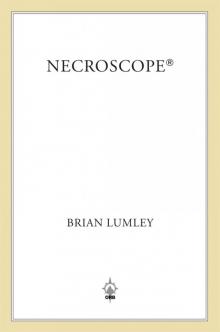 Necroscope®
Necroscope® Dreamlands 5: Questers for Kuranes: Two Tales of Hero and Eldin
Dreamlands 5: Questers for Kuranes: Two Tales of Hero and Eldin The Taint and Other Novellas: Best Mythos Tales Volume 1
The Taint and Other Novellas: Best Mythos Tales Volume 1 Necroscope: Defilers
Necroscope: Defilers Beneath the Moors and Darker Places
Beneath the Moors and Darker Places The Fly-By-Nights
The Fly-By-Nights Khai of Khem
Khai of Khem Ship of Dreams
Ship of Dreams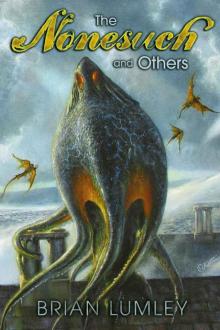 The Nonesuch and Others
The Nonesuch and Others Blood Brothers
Blood Brothers Necroscope
Necroscope The Burrowers Beneath
The Burrowers Beneath Bloodwars
Bloodwars No Sharks in the Med and Other Stories
No Sharks in the Med and Other Stories The House of Doors - 01
The House of Doors - 01 Screaming Science Fiction
Screaming Science Fiction Necroscope III: The Source
Necroscope III: The Source Vampire World I: Blood Brothers
Vampire World I: Blood Brothers Iced on Aran
Iced on Aran Necroscope: Invaders
Necroscope: Invaders Necroscope: The Lost Years
Necroscope: The Lost Years Return of the Deep Ones: And Other Mythos Tales
Return of the Deep Ones: And Other Mythos Tales Necroscope V: Deadspawn
Necroscope V: Deadspawn Titus Crow, Volume 3: In the Moons of Borea, Elysia
Titus Crow, Volume 3: In the Moons of Borea, Elysia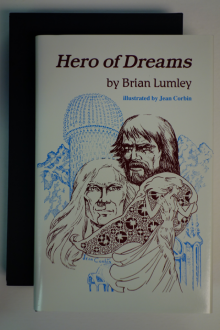 Hero of Dreams
Hero of Dreams Necroscope IV: Deadspeak
Necroscope IV: Deadspeak The Last Aerie
The Last Aerie The Second Wish and Other Exhalations
The Second Wish and Other Exhalations Necroscope: The Touch
Necroscope: The Touch Necroscope: The Plague-Bearer
Necroscope: The Plague-Bearer Necroscope: Avengers
Necroscope: Avengers Necroscope II: Wamphyri
Necroscope II: Wamphyri Necroscope II_Vamphyri!
Necroscope II_Vamphyri! A Coven of Vampires
A Coven of Vampires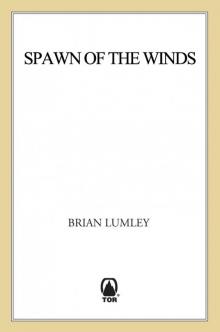 Spawn of the Winds
Spawn of the Winds Sorcery in Shad
Sorcery in Shad Deadspawn
Deadspawn Necroscope V: Deadspawn n-5
Necroscope V: Deadspawn n-5 Necroscope: Invaders e-1
Necroscope: Invaders e-1![Beneath the Moors and Darker Places [SSC] Read online](http://i1.bookreadfree.com/i/03/20/beneath_the_moors_and_darker_places_ssc_preview.jpg) Beneath the Moors and Darker Places [SSC]
Beneath the Moors and Darker Places [SSC]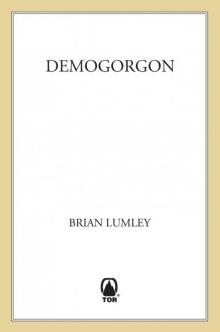 Demogorgon
Demogorgon Harry and the Pirates_and Other Tales from the Lost Years
Harry and the Pirates_and Other Tales from the Lost Years Necroscope IV: Deadspeak n-4
Necroscope IV: Deadspeak n-4 Deadspeak
Deadspeak The Taint and Other Novellas
The Taint and Other Novellas Blood Brothers vw-1
Blood Brothers vw-1 The Source n-3
The Source n-3 In the Moons of Borea
In the Moons of Borea Avengers
Avengers Necroscope n-1
Necroscope n-1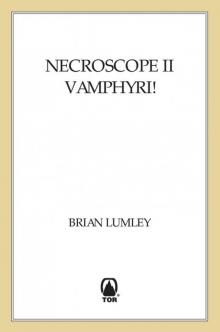 Vamphyri!
Vamphyri! Questers for Kuranes: Two Tales of Hero and Eldin
Questers for Kuranes: Two Tales of Hero and Eldin Necroscope II: Wamphyri! n-2
Necroscope II: Wamphyri! n-2 The Source
The Source Elysia
Elysia The Plague-Bearer
The Plague-Bearer The Touch
The Touch Invaders
Invaders Necroscope 4: Deadspeak
Necroscope 4: Deadspeak Compleat Crow
Compleat Crow The Mobius Murders
The Mobius Murders Defilers
Defilers